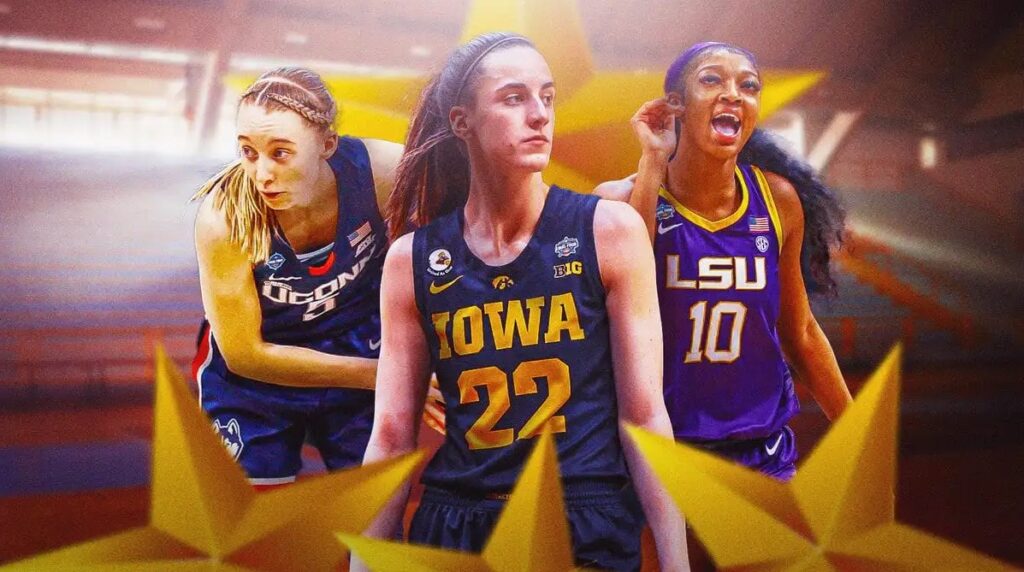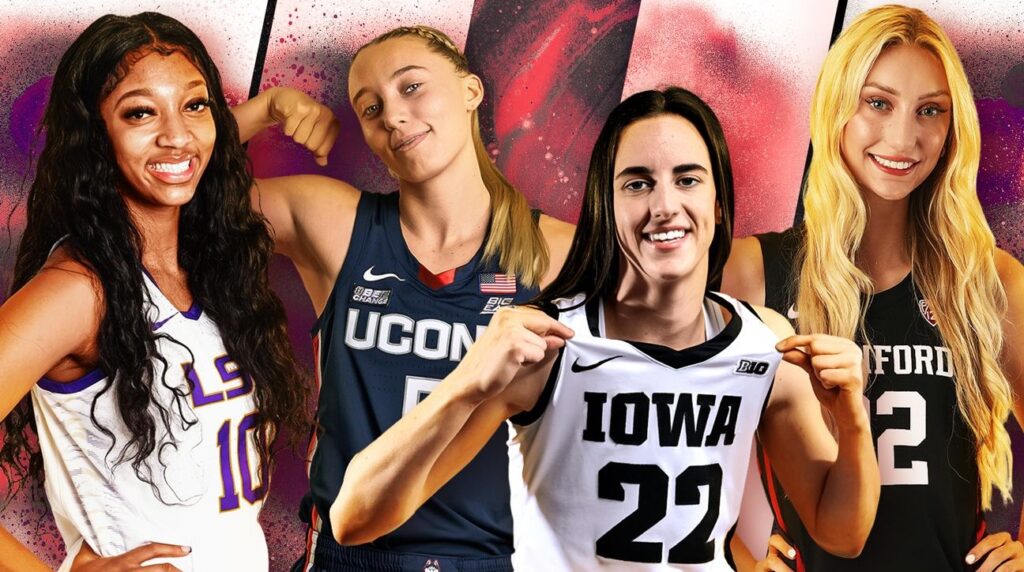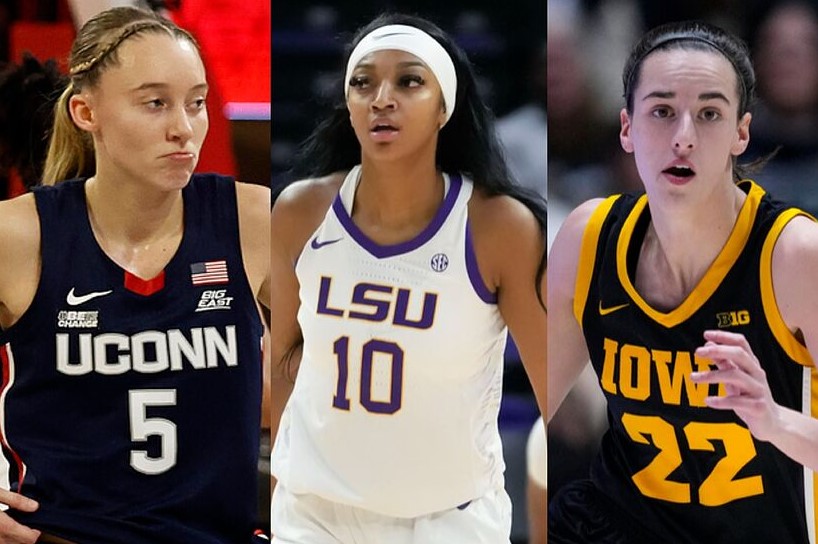The post ‘Caitlin Clark, Angel Reese, Paige Bueckers make CBA stance 100% clear’ appeared first on ClutchPoints
The WNBA’s ongoing collective bargaining agreement (CBA) negotiations have reached a critical point in 2025, sparking widespread debate about fair compensation, media revenue, and generational unity—and now, three of the league’s most high-profile young stars have made it abundantly clear where they stand in this rapidly intensifying battle.
Caitlin Clark of the Indiana Fever, Angel Reese of the Chicago Sky, and Paige Bueckers of the Dallas Wings have reportedly taken a firm and vocal stance in full support of their fellow WNBA athletes, especially the veterans who have long carried the burden of demanding equitable treatment for professional women’s basketball players.
Their commitment was confirmed in a recent ESPN report by Alexa Philippou and Ramona Shelburne, revealing that all three attended the pivotal pre-All-Star Weekend player meeting and pledged full solidarity with the Women’s National Basketball Players Association (WNBPA) and its fight for a more equitable CBA moving forward.

The significance of this development cannot be overstated, especially as whispers of generational division had begun to spread across social media, fueled by questions about whether these younger athletes were willing to follow the lead of WNBA icons who had spent over a decade paving the road for change.
According to sources familiar with the meeting, Clark, Reese, and Bueckers not only showed up but actively participated in the discussion, expressing their belief that change is overdue and emphasizing that they fully understand the stakes involved—not just for themselves but for every woman who puts on a WNBA jersey.
Their unified action followed a powerful moment at the All-Star Game, where all 22 All-Star players wore “Pay Us What You Owe Us” T-shirts—an unmistakable message aimed at league executives and sponsors who continue to profit from the WNBA’s growing popularity while maintaining outdated compensation structures.
Veteran leaders like WNBPA president Nneka Ogwumike, MVP Breanna Stewart, and Phoenix Mercury forward Satou Sabally have been at the forefront of this movement, and their leadership over the All-Star Weekend was instrumental in reminding the basketball world that the WNBA’s growth must translate into tangible, equitable outcomes for its players.

With the media rights deal recently inked by the WNBA—valued at approximately $2.2 billion over 11 years with Disney, Amazon Prime Video, and NBCUniversal—the players argue that there’s no longer any excuse for salaries and benefits to remain stagnant while the league’s corporate partners reap historic profits.
The players who attended the Thursday CBA meeting—over 40 in total—emphasized that they are not just fighting for individual gain, but for structural transformation across the entire league, advocating for a revenue-sharing model that reflects the reality of the modern sports media landscape.
In the past, critics have occasionally labeled younger stars as too focused on endorsements or social media presence rather than collective action, but this latest show of unity from Clark, Reese, and Bueckers has thoroughly dismantled that narrative and sent a strong signal to both fans and league officials alike.
“It was super important that they all decided, ‘Yes, we’ll do this,’” an insider told ESPN. “Caitlin did it, Angel did it. They were both at the [Thursday] meeting. Paige did it. They are bought in, they’re serious about this, and they’re unified.”
Still, not everyone in the basketball world seems convinced, as former NBA legend Dwyane Wade shared a more skeptical view during his podcast “Time Out with Dwyane Wade,” cautioning that younger WNBA players must show greater respect for the sacrifices of past generations before demanding change.
On the podcast, Wade remarked that legends like Candace Parker “never got to experience the things that they’re experiencing right now,” and implied that new players need to fully understand the blood, sweat, and tears that older players endured just to keep the league alive during its early, financially fragile years.
While Wade didn’t mention any specific players by name, his comments raised eyebrows, particularly in the wake of the All-Star Weekend’s visual show of unity, where Clark, Reese, and Bueckers stood shoulder to shoulder with the very veterans Wade praised—making it clear they’re not shying away from the legacy, but rather building upon it.

What’s becoming increasingly apparent is that this new generation of WNBA players isn’t just talented on the court—they are also increasingly aware of their power off the court, both as businesswomen and as advocates for equality within a professional sports system that still lags far behind its male counterpart.
The optics of rookies and rising stars stepping up during one of the most important labor battles in WNBA history speaks volumes about how deeply the message of solidarity has resonated throughout the league’s locker rooms, press conferences, and public statements in 2025.
For Caitlin Clark, who has become the most talked-about rookie since Diana Taurasi, the decision to align publicly with veteran voices demonstrates not only humility but also a willingness to use her platform responsibly, especially at a time when many young athletes are still finding their footing in the spotlight.
Angel Reese, whose charisma and fearless energy have made her a fan favorite across the country, is continuing to prove that her impact reaches far beyond viral highlights—she is an emerging leader who recognizes the importance of long-term change over short-term gain.
Meanwhile, Paige Bueckers, who has battled injuries and setbacks yet remains one of the most promising players of her generation, is showing that leadership is not just about accolades but also about choosing to stand up and speak out when the moment demands courage and clarity.
Together, these three athletes represent the bridge between past and future in women’s basketball, and their choice to publicly and unequivocally back the CBA demands sends a loud, clear message: they are not merely the face of the WNBA’s marketing campaigns—they are part of the soul of its movement.
As the next round of negotiations looms, the pressure on the league’s decision-makers will only intensify, and with every passing week, the question will not be whether players deserve more—but how much longer they’ll wait before they get it.
Whether this unified front holds through the next labor deadline or leads to further protests or potential work stoppages remains to be seen, but one thing is crystal clear now—Clark, Reese, and Bueckers are all in, and they’re not backing down.